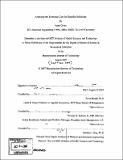Assessing the economic case for stratified medicine
Author(s)
Goren, Amir, S.M. Massachusetts Institute of Technology
DownloadFull printable version (2.105Mb)
Alternative title
Economic case for stratified medicine
Other Contributors
Harvard University--MIT Division of Health Sciences and Technology.
Advisor
Ernst Berndt and Thomas G. Roberts, Jr.
Terms of use
Metadata
Show full item recordAbstract
The goal of this study is to explore the economic conditions that favor the joint development of therapeutics and companion diagnostics. I hypothesize that predictive biomarkers can generate economic value in drug development by increasing success rates. I construct an economic model of the development of a hypothetical new therapy, and devote particular attention to parameters regarding safety, efficacy, cost, and market size, within a decision-theoretic framework. The results include a characterization of the dynamic net present value trade-offs between stratum size and biomarker success, as well as the identification of two complementary concepts of stratified medicine, namely, disease reclassification and value-based reimbursement. I also identify a strong potential incentive mechanism in the hands of public policy makers that could facilitate a resolution of the tension between patient interests and the interests of pharmaceutical sponsors. The conclusion is that a biomarker can compensate for smaller stratum by increasing success probabilities. However, the effects of longer development time due to biomarker inclusion counter the effects of improved success probabilities. Longer exclusivity periods for stratified medicine may be required in order to resolve the tension between patient interests and the interests of pharmaceutical sponsors.
Description
Thesis (S.M.)--Harvard-MIT Division of Health Sciences and Technology, 2007. Includes bibliographical references (leaves 36-39).
Date issued
2007Department
Harvard University--MIT Division of Health Sciences and TechnologyPublisher
Massachusetts Institute of Technology
Keywords
Harvard University--MIT Division of Health Sciences and Technology.